Originally posted on November 15, 2023 @ 3:52 am
Black cats have long been associated with bad luck and superstitions. Many people fear crossing paths with a black cat, believing it to bring misfortune into their lives. But where did this belief come from, and is there any truth to it? In this section, we will explore the origins of the superstitions surrounding black cats and their relevance in today’s culture.
Key Takeaways
- The association between black cats and bad luck is a long-standing superstition.
- Superstitions surrounding black cats vary across different cultures and regions.
- Despite the lack of factual basis, beliefs about black cats continue to influence people’s attitudes towards them.
- Education and positive media representation may play a role in changing perceptions of black cats in modern society.
- Cat rescue organizations play a crucial role in promoting black cat adoption and dispelling myths surrounding them.
The Symbolism of Black Cats Throughout History
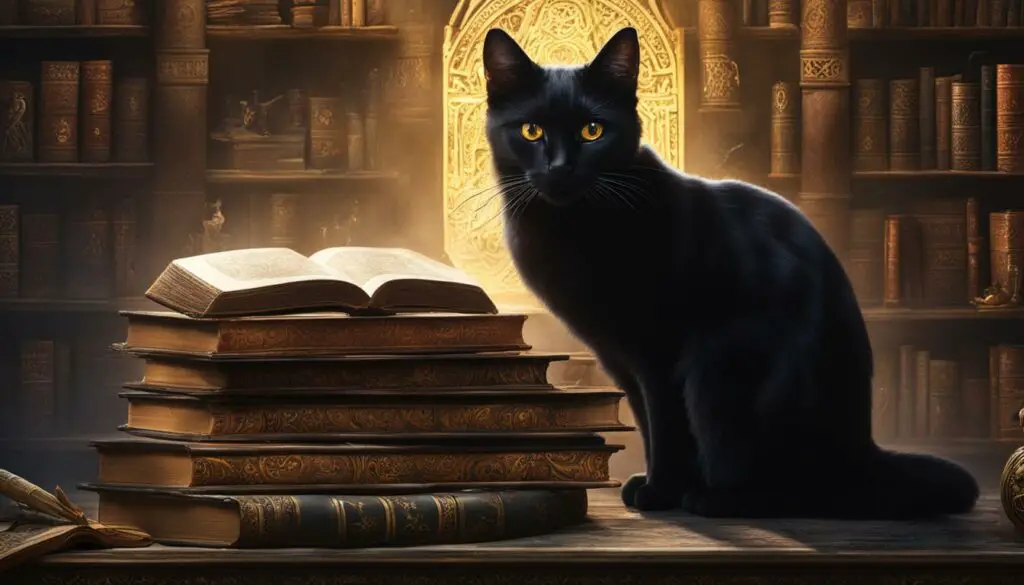
Black cats have been a subject of fascination and superstition throughout history. In many cultures, they are often associated with magic, witches, and bad luck. However, in others, they are seen as symbols of protection, good fortune, and even divine beings. This section will explore the diverse symbolism of black cats in different cultures and time periods.
Ancient Egypt:
In ancient Egypt, cats were highly revered and considered sacred animals. The goddess Bastet, who was associated with fertility, love, and protection, was often depicted as a woman with the head of a cat. Black cats were especially revered as symbols of good luck and protection. They were believed to ward off evil spirits and bring prosperity and happiness to their owners.
Medieval Europe:
During the medieval period in Europe, black cats were often associated with witches and considered evil omens. Many people believed that witches could shapeshift into black cats and that they protected the witches from harm. As a result, black cats were persecuted and killed in large numbers during the infamous witch hunts of the 15th and 16th centuries.
Japan:
In Japan, black cats are seen as symbols of good luck and prosperity. The Maneki-Neko, a famous Japanese figurine of a cat with a raised paw, is believed to bring good fortune and success to its owner. Black Maneki-Neko statues are said to be especially powerful and are often placed in business establishments and homes.
Modern Western Culture:
In modern Western culture, black cats are often associated with Halloween and considered unlucky. Many people believe that crossing paths with a black cat will bring bad luck or even death. However, there are also many who view black cats as symbols of mystery and elegance, and they are often featured in fashion, art, and media.
Overall, the symbolism of black cats has varied greatly across cultures and time periods. While they continue to be the subject of superstition and controversy, they are also beloved as loyal pets and revered as symbols of good luck and protection.
How the Superstition Originated
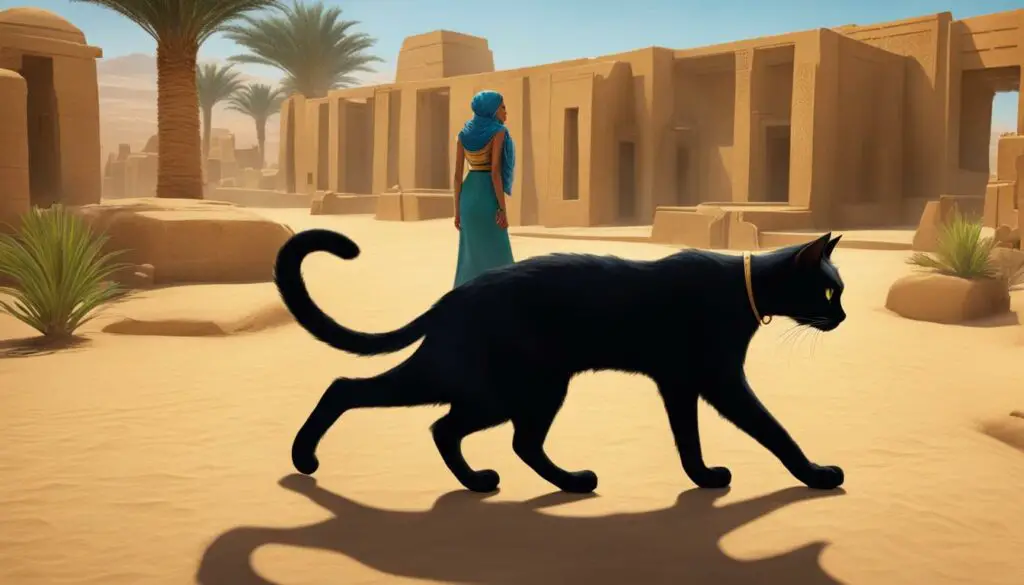
The belief that black cats bring bad luck has been around for centuries, but the specific origins of this superstition are unclear. One theory suggests that it originated from ancient Egyptian mythology, where black cats were revered and often depicted alongside the goddess Bastet, who was associated with protection and good luck. However, when Christianity spread throughout Europe, black cats began to be associated with witchcraft and evil, leading to the belief that they brought bad luck.
Another possible origin of this superstition lies in the Middle Ages. During this time, black cats were believed to be witches in disguise, and people were encouraged to kill them. As a result, the population of black cats decreased significantly, which in turn led to an increase in the rat population. This, in turn, played a role in the spread of the bubonic plague. The association of black cats with the plague may have reinforced the belief that they were bad luck.
The Relationship Between Superstitions and Beliefs About Black Cats
The origins of black cat superstitions are closely tied to cultural and historical factors. While many people today recognize that these superstitions are unfounded, there are still those who believe that black cats bring bad luck. These beliefs may stem from a variety of sources, including cultural upbringing, personal experiences, and exposure to media and popular culture.
It is important to recognize that superstitions surrounding black cats are just that – beliefs without factual basis. While it is natural to feel apprehensive around these animals due to cultural conditioning, it is crucial to remember that black cats are no different from any other feline. In fact, they can make excellent pets and companions.
“The association of black cats with the plague may have reinforced the belief that they were bad luck.”
Black Cats in Popular Culture
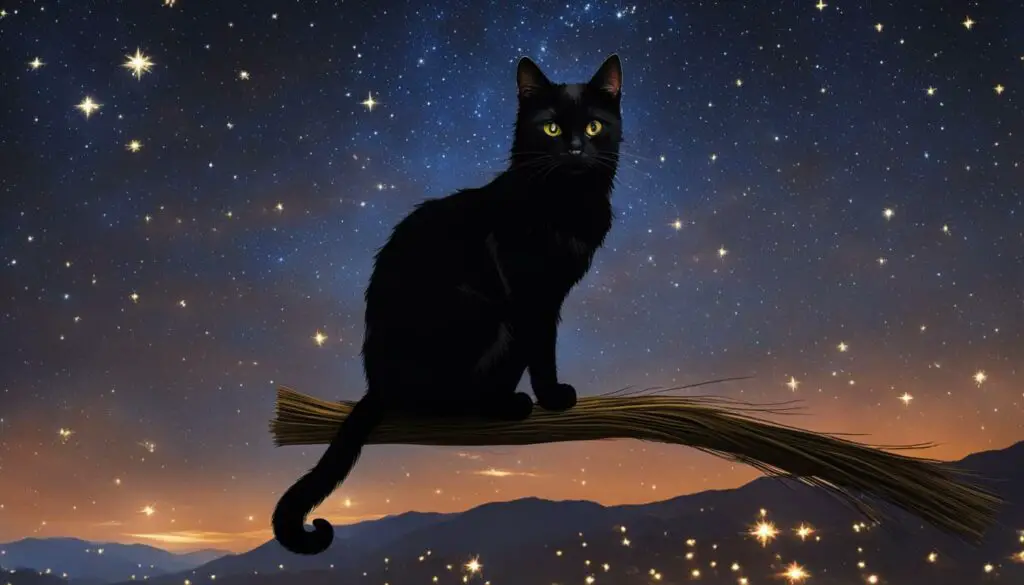
The superstitions surrounding black cats and their association with bad luck have influenced their portrayal in popular culture. In movies, literature, and other forms of media, black cats are often depicted as ominous symbols of evil, foreboding, and misfortune.
One of the most well-known examples of this is the portrayal of the black cat in Edgar Allan Poe’s famous short story, “The Black Cat.” In the story, the protagonist’s love for his black cat turns into an obsession, which eventually leads to his downfall and demise. This serves as a powerful illustration of the belief that black cats bring bad luck.
Another example of the negative portrayal of black cats is in the movie “Hocus Pocus.” In the film, a group of witches use a black cat as part of a spell to help them achieve their evil goals, highlighting the idea that black cats are associated with dark arts and malevolent intent.
Despite these negative representations, there are also examples of black cats being celebrated in popular culture. In Japan, for instance, black cats are considered good luck and are featured in many forms of media, including anime and manga. In “Sailor Moon,” one of the most famous anime series of all time, the character Luna takes the form of a black cat and is a powerful ally to the show’s protagonists.
Overall, the portrayal of black cats in popular culture reflects the superstitions and beliefs surrounding them. While some media representations perpetuate negative stereotypes, others seek to challenge and subvert these beliefs, highlighting the importance of awareness and education in changing perceptions about black cats.
The Intersection of Black Cats and Halloween
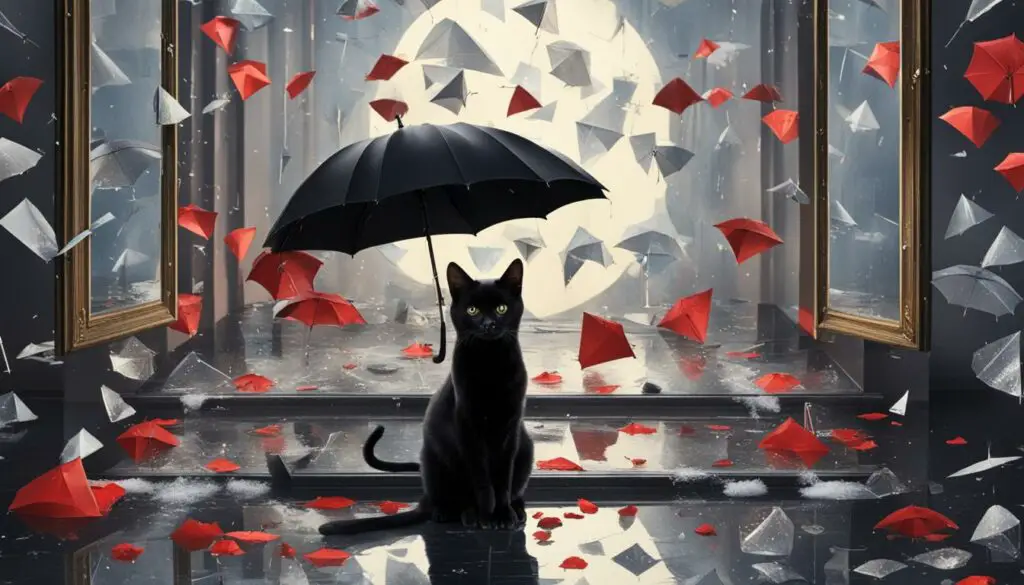
Superstitions about black cats have been deeply ingrained in Halloween traditions for centuries. Many believe that crossing paths with a black cat during this time of year can lead to bad luck. However, the origins of this association are not entirely clear.
Some historians believe that the superstition surrounding black cats and Halloween can be traced back to the Middle Ages, when cats were often associated with witchcraft. It was believed that witches could transform into black cats and back again, and that these animals were their familiar spirits.
“If a cat crossed the path of a person, and the person did not capture the cat, the luck of the person was sure to be good. If the person succeeded in capturing the cat, he should kill it, or else he would have bad luck.”
Despite these beliefs, many cultures throughout history have actually viewed black cats as a symbol of good luck and fortune. For example, in Ancient Egypt, black cats were worshipped and considered sacred animals.
Regardless of their symbolic significance, black cats are often portrayed in popular media as spooky and mysterious creatures. This perpetuates the superstitions surrounding them, especially during the Halloween season.
While the association between black cats and Halloween may be steeped in myth and superstition, it is important to remember that these animals deserve love and respect just like any other creature. Rather than fearing them, it’s important to appreciate the beauty and uniqueness of black cats, and recognize them as the loving companions that they are.
Debunking the Superstition
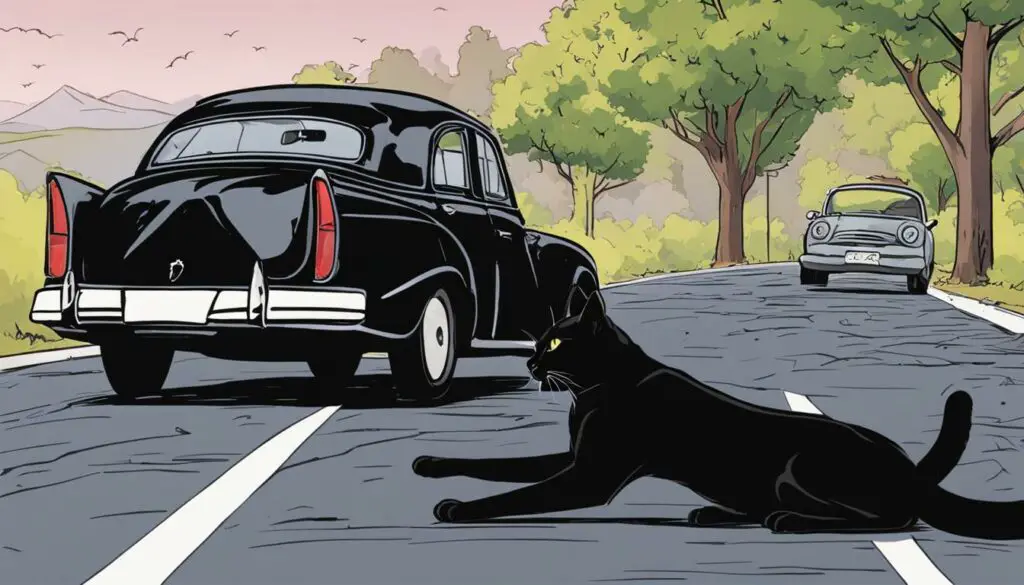
Many people believe that running over a black cat brings bad luck. However, it is essential to understand that these are just superstitions without any factual basis.
While black cats have been associated with bad luck and witchcraft throughout history, there is no evidence to support these beliefs. In fact, in many cultures, black cats are considered good luck symbols. For example, in Japan, a black cat is believed to bring good fortune to businesses, while in Scotland, a black cat appearing on your doorstep is considered a sign of prosperity.
Moreover, the superstition that running over a black cat is bad luck is baseless. It is unfortunate for the cat, but it is not an omen of bad luck. In reality, superstitions surrounding black cats affect their adoption rates, making it challenging for them to find loving homes. It is up to us to challenge these beliefs and give black cats the chance they deserve.
It is crucial to understand that superstitions are just that – beliefs without any factual basis. While black cats may be associated with superstitions, they are unique and beautiful creatures that deserve love and care just like any other animal. So, the next time you cross paths with a black cat, don’t let superstitions cloud your judgment. Instead, take a moment to appreciate their beauty and unique personalities.
Cultural Variances in Black Cat Superstitions
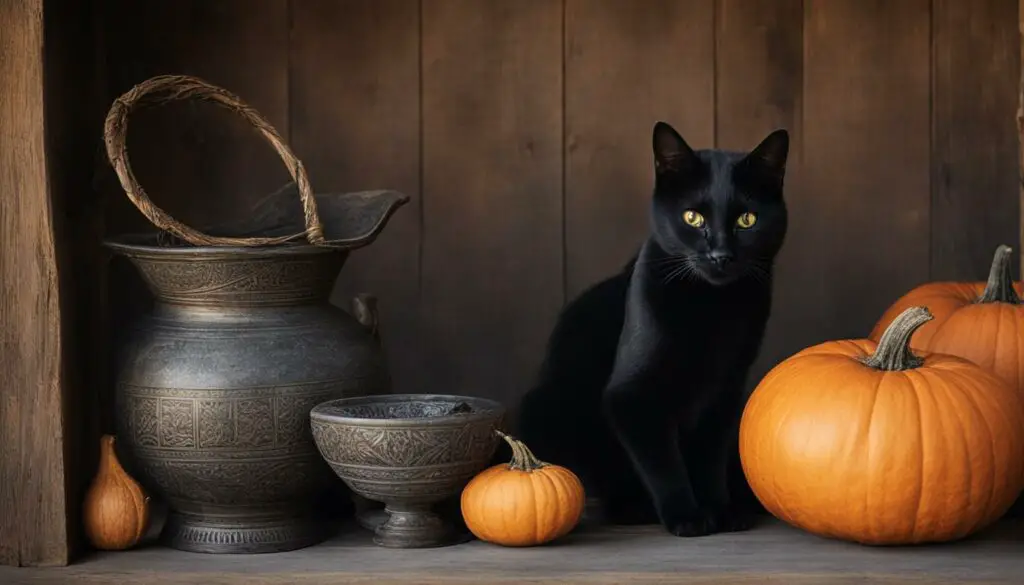
Beliefs about black cats vary greatly across different cultures and regions. While some cultures view black cats as symbols of good luck, others associate them with bad omens and misfortune. Let’s take a closer look at how black cats are perceived in some cultures.
Japan
In Japan, black cats are considered to bring good luck and fortune. The Japanese believe that owning a black cat can ward off evil spirits and bring prosperity to the household. In fact, black cats are so highly regarded in Japan that they have their own special day – “Black Cat Day” – on August 17th.
Scotland
Scottish folklore associates black cats with witches and dark magic. It is believed that if a black cat appears on your doorstep, it is a sign that a witch is nearby. However, if a black cat walks towards you, it is a sign of good luck. Scottish tradition also holds that a black cat arriving at a home signifies prosperity and wealth.
India
In Indian culture, black cats are generally seen as symbols of bad luck and misfortune. It is believed that if a black cat crosses your path, it indicates an upcoming tragedy or accident. However, there is a belief that if a black cat walks away from you, it will take any bad luck with it.
These are just a few examples of the varied beliefs and traditions surrounding black cats. As we can see, the perception of these beautiful creatures is not universal, and it’s important to respect and appreciate these cultural differences.
Pet Adoption Challenges for Black Cats
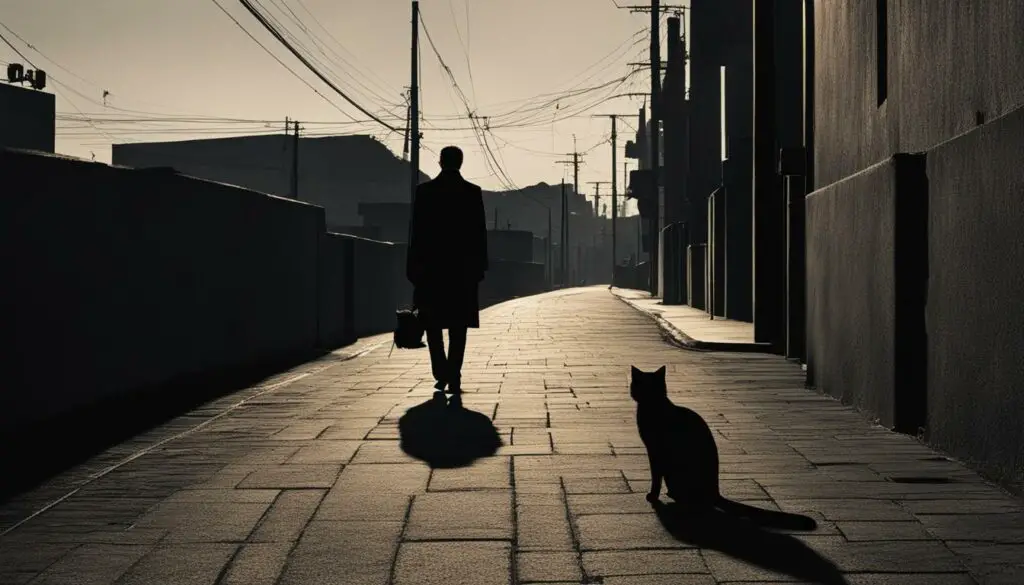
Unfortunately, black cats face unique challenges in the adoption process due to the superstitions surrounding them. Many people believe that crossing paths with a black cat brings bad luck, making them reluctant to adopt black cats.
According to a study by the ASPCA, black cats are adopted at a rate that is significantly lower than other colored cats. It is a heartbreaking reality that black cats spend more time in shelters waiting for their forever homes compared to their counterparts.
However, various efforts are being made to dispel these myths and promote the adoption of black cats. Some animal shelters and rescue organizations host events specifically for black cats, and many online campaigns aim to raise awareness about their plight.
It’s important to remember that a cat’s color has no bearing on their personality or behavior. Black cats can make loving and loyal companions just like any other cat. By opening our hearts and minds, we can give these beautiful felines the opportunity to find their forever homes.
The Positive Side of Black Cats
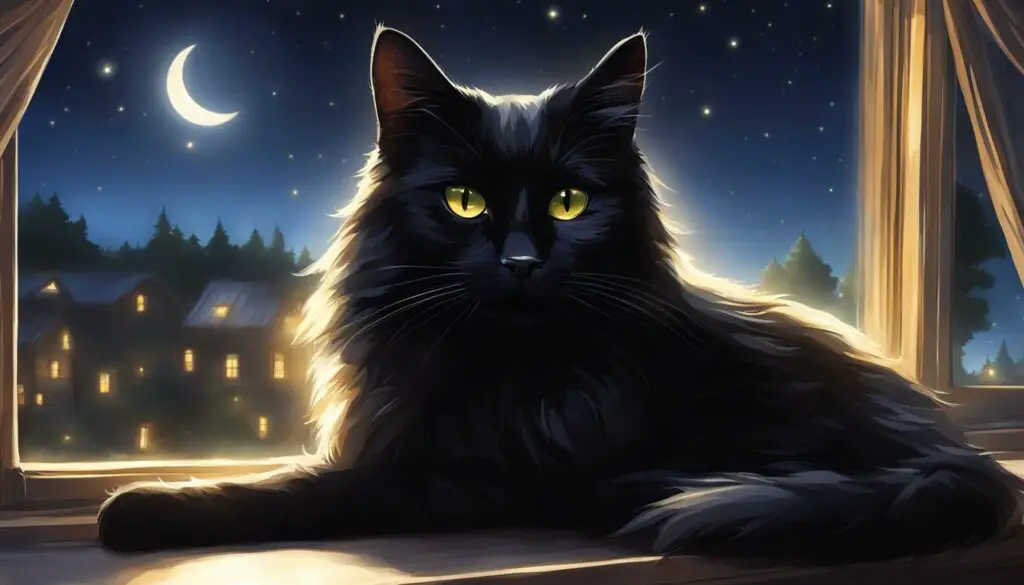
Despite the negative superstitions surrounding black cats, they have also been associated with positive symbolism in many cultures throughout history. In ancient Egyptian mythology, black cats were worshipped and believed to bring good fortune to their owners. The Norse goddess Freya was often depicted with black cats, who were believed to bring blessings and prosperity.
In many European cultures, black cats are considered a symbol of good luck and fortune. Sailors would often bring black cats on board their ships, believing they would bring them luck and protect them from harm. In Japan, black cats are seen as a symbol of prosperity and good fortune in business.
Aside from their symbolism and mythological significance, black cats also make wonderful pets. They are known to be affectionate, playful, and intelligent. In fact, some cat lovers believe that black cats have a distinct and unique personality, making them all the more lovable.
“Black cats have a distinct and unique personality, making them all the more lovable.”
In conclusion, black cats have been unfairly stigmatized due to unfounded superstitions. However, they are also associated with positive symbolism and make wonderful companions. By understanding and appreciating the positive aspects of black cats, we can challenge and change the negative perceptions that still exist in modern society. Let us celebrate these beautiful creatures for the unique and special animals they are.
Changing Perceptions in Modern Society
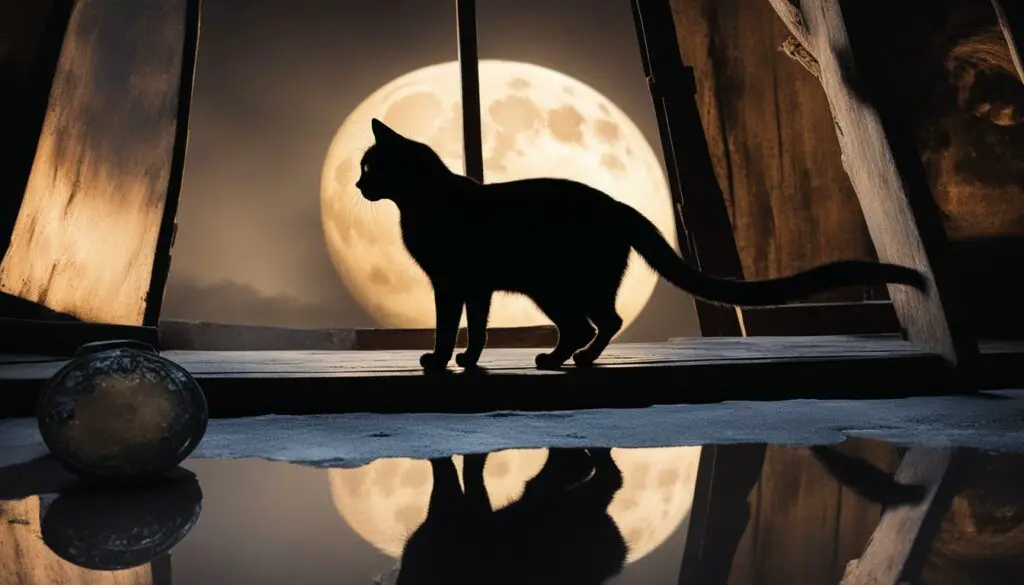
Black cats have historically been associated with bad luck and superstition, leading to a negative perception of these beautiful felines. However, in recent years, there has been a shift in attitudes towards black cats as people become more educated about the myths surrounding them.
Cultural beliefs play a significant role in shaping perceptions of black cats, but awareness campaigns and positive media representation have helped to challenge these beliefs. For instance, in Japan, black cats are considered a good omen and bring good luck, which has helped to change the negative perception of black cats in the country. Similarly, organizations like Black Cat Rescue are working to dispel superstitions and promote black cat adoption through education and advocacy.
As a result of these efforts, black cats are increasingly being recognized for their beauty, playfulness, and unique personalities, and are being welcomed into loving homes. People are beginning to see past the unfounded fears surrounding black cats and appreciate them for the amazing companions they can be.
The Benefits of Adopting a Black Cat
Adopting a black cat can bring numerous benefits to your life. For one, black cats are known for their intelligence and playful personalities, making them great companions for families and individuals alike. Additionally, black cats are often overlooked for adoption due to superstitions surrounding them, meaning you could be giving a loving home to an animal that might otherwise have been passed over.
Moreover, adopting a black cat can be a powerful statement against the superstitions that have plagued these amazing animals for so long. By opening your heart and home to a black cat, you are showing the world that you recognize the beauty and joy that they bring, regardless of the superstitions that some people still hold on to.
Cat Rescue Organizations and Black Cats
It is no secret that black cats can face challenges in the adoption process due to the superstitions surrounding them. Thankfully, there are cat rescue organizations that are dedicated to changing this perception and finding homes for these beautiful felines.
These organizations work tirelessly to educate the public on the true nature of black cats and dispel the myths surrounding them. They showcase the unique personalities and characteristics of black cats, highlighting their playful, affectionate, and curious nature.
One such organization is Black Cat Rescue, which is based in Boston and specializes in rescuing and finding homes for black cats. Its website features a “Black Cat Mythbusters” section that aims to address common misconceptions about black cats and explain why they are no different from any other cat.
Another organization that has made it its mission to promote black cat adoption is the Lucky Black Cat Rescue in California. In addition to rescuing black cats and finding them forever homes, they work to spread awareness about the positive aspects of black cats and why they are just as deserving of love and affection as any other cat.
These organizations serve as a beacon of hope for black cats in need of a loving home. Their efforts are truly commendable, and they play a vital role in challenging and changing the negative perceptions surrounding black cats.
Conclusion
In conclusion, we have explored the superstitions surrounding black cats and their association with bad luck. Through our analysis, we have discovered that these beliefs are often steeped in cultural history and mythology, rather than any factual evidence.
While it is important to acknowledge the fear that black cats may evoke in some people, it is also crucial to recognize the beauty and uniqueness of these feline friends.
The Important Role of Education
Through education and awareness campaigns, we can work to change negative attitudes towards black cats and dispel the myths that surround them. By highlighting the positive aspects of black cats and their cultural significance, we can encourage people to embrace these furry companions and appreciate the joy they can bring to our lives.
Supporting Cat Rescue Organizations
Additionally, supporting cat rescue organizations that promote black cat adoption can help to increase their adoption rates and reduce the number of cats in shelters. By providing these cats with loving homes, we can help to dispel the superstitions that prevent them from finding loving families.
Ultimately, the true value of black cats lies not in superstitions or beliefs, but in their unique personalities, playful nature, and loyal companionship. By fostering positive attitudes towards black cats, we can ensure that they receive the love and care they deserve.
FAQ
Is it bad luck to run over a black cat?
No, it is not bad luck to run over a black cat. Superstitions surrounding black cats are just beliefs without factual basis.
What are some superstitions about black cats?
Some superstitions surrounding black cats include that they bring bad luck, crossing paths with a black cat is unlucky, and they are associated with witchcraft and the occult.
What are some black cat myths and folklore?
Black cats have been portrayed in various myths and folklore throughout history. They have been associated with both good luck and bad luck, depending on the culture and time period.
How did the superstition about black cats originate?
The superstition surrounding black cats originated from historical events and cultural factors that contributed to the belief that they were associated with witchcraft and evil spirits.
How are black cats portrayed in popular culture?
Black cats are often depicted as symbols of bad luck and witches in popular culture, appearing in movies, literature, and other forms of media. These portrayals have influenced the superstitions surrounding them.
What is the connection between black cats and Halloween?
Black cats have long been associated with Halloween, as they are considered to be mystical and linked to witches and magic. Superstitions surrounding black cats are particularly prevalent during this time of year.
Is it true that running over a black cat is bad luck?
No, running over a black cat is not inherently bad luck. Superstitions are just beliefs without factual basis, and there is no evidence to support this claim.
How do black cat superstitions vary across different cultures?
Black cat superstitions vary across different cultures and regions. In some cultures, black cats are considered good luck, while in others, they are associated with bad luck and misfortune.
Do black cats face challenges in the adoption process?
Yes, black cats often face challenges in the adoption process due to superstitions and beliefs about them bringing bad luck. Efforts are being made by organizations to dispel these myths and promote black cat adoption.
What are the positive aspects associated with black cats?
Black cats have positive symbolism in various cultures, representing good luck and protection. They are also known for their beauty and unique characteristics.
How have perceptions of black cats changed in modern society?
Perceptions of black cats have changed in modern society due to awareness campaigns, education, and positive media representation. People are now more aware that superstitions about black cats are unfounded.
How do cat rescue organizations promote black cat adoption?
Cat rescue organizations work to change public perception by promoting black cat adoption and dispelling superstitions. They educate potential adopters about the true nature of black cats and find loving homes for them.
